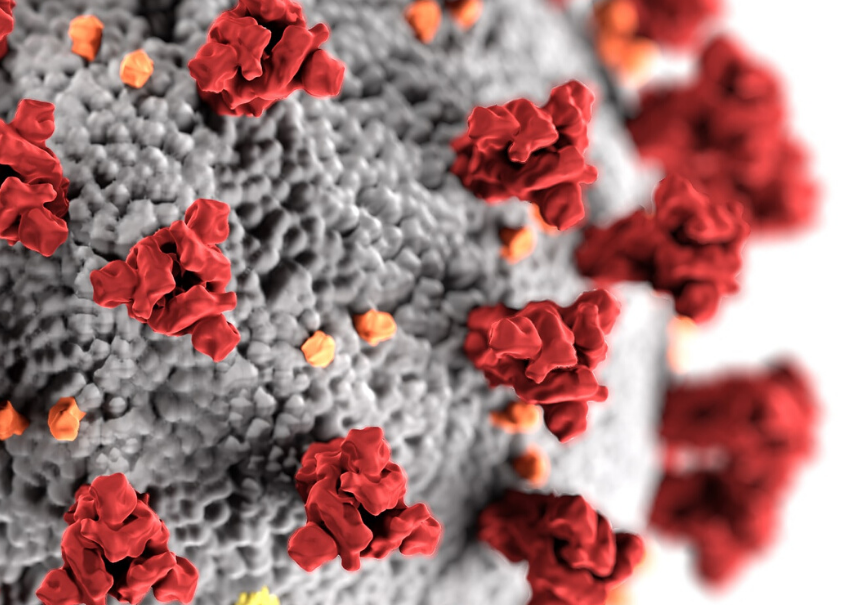
Photo by CDC on Unsplash
University of Guelph experts are front and centre in the coronavirus conversation and how research can be applied to help Canadians understand, manage and react to the unprecedented situation we find ourselves facing.
Researchers are working collaboratively across disciplines and partnering with industry to share their expertise and resources in the fight against COVID-19.
We share with our community, just a few of the many ways in which University of Guelph research is supporting the fight against COVID-19 and helping Canadians stay informed about COVID-19-related impacts.
Food Systems in a Time of Disruption: Impacts of COVID-19 on Food Access, Safety, Security and Supply
As Canada's Food University, the University of Guelph has continued to be a trusted, knowledgeable voice as the world asks questions about the global food supply, food prices and the supply chain.
The Arrell Food Institute recently published an article that helps explain the strength of Canada's food supply chains and how decision-makers can help keep them robust. Canada's 2020 Food Price Report, a collaboration between U of G and Dalhousie University, reassures consumers that food prices should remain stable as the world navigates COVID-19 and explains how some of our shopping and eating habits may change.
Department of Food Science Prof. Jeff Farber, has taken to social media to share advice on how to safely shop for groceries during the pandemic.
And, Prof. Lawrence Goodridge, Leung Family Professor in Food Safety Canadian Research Institute for Food Safety at the University of Guelph provides expertise in assessing safety and risk associated with take-out.
One Health: COVID-19 pandemic shows human, animal and environmental health requires coordinated, multidisciplinary approach
The interaction between humans, animals and the environment can be a complex issue to understand. University of Guelph researchers are working to understand, manage and react to COVID-19 impacts on the one health paradigm, and how we can work together to find meaningful solutions in the fight against COVID.
Researchers are contributing in areas ranging from pathology, population medicine, to biomedical sciences and animal behaviour.
Biomedical Sciences, Prof, Glen Pyle, along with student Lauren Philippi, Human Health and Nutritional Sciences, are looking at how those with heart disease can be particularly affected by COVID 19. The virus mainly targets the respiratory system, triggering an inflammatory response that fills the lungs with fluid and causes difficulty breathing. As lung function becomes limited, oxygen levels in the blood decrease. In patients with cardiovascular disease, cardiovascular function is already strained, and this extra demand may be enough to cause a catastrophic failure. The researchers say a healthy immune system is critical for defending the body against viruses like COVID-19, but many people living with cardiovascular disease have an impaired immune system.
Prof. Scott Weese, an expert in zoonotic infections, will be part of a research initiative investigating the global management of COVID-19 using the “One Health” approach in which human and animal health experts collaborate to manage infectious disease. The team will use rapid data gathering and analysis methods to identify areas requiring attention, and make recommendations for improving infectious disease response.
In another project, population medicine Prof. Amy Greer, an expert in infectious disease modelling, uses math and statistical modelling to forecast and track the spread of coronavirus across Canada and has built simulations to guide Canadian health agencies in limiting the spread of the virus.
The spread of the COVID-19 outbreak has highlighted the importance of having effective global surveillance systems in place when it comes to infectious animal diseases. Prof. Rozita Dara, School of Computer Science, has discovered Twitter can be another tool in helping to detect the spread of infectious animal disease outbreaks, sometimes even earlier than conventional tracking methods. While the researchers tested the effectiveness of the social media application using avian influenza, this framework could also be applied to monitoring the threat of new infectious diseases in general.
And as we self-isolate and become more anxious about the virus, how is it affecting our pets -- which in some cases may be our only companions? Prof. Lee Niel, behavioural biologist with the Department of Population Medicine as well as the Campbell Centre for the Study of Animal Welfare, says stress and tension may influence how we interact with pets. If that interaction is radically different than usual, or if you're agitated or clingy, your pets might sense it.
Business agility in times of pandemic
What kind of changes do businesses need to make in the face of the COVID-19 pandemic and the potential economic slowdown that might follow? And what is involved in organizations moving to new business models, such as embracing ecommerce? Prof. Felix Arndt, Chair in Entrepreneurship in the Department of Management at the Gordon S. Lang School of Business and Economics research offers insights on how organizations stay agile and ahead of others during uncertain times.
Prof. Nita Chhinzer, Department of Management research focuses on downsizing practices, procedures and ethics. Chhinzer has offered media advice on how companies can maintain safety during human resource changes.
Director of the International Institute for Sport Business and Leadership at U of G’s Gordon S. Lang School of Business and Economics, Prof. Norm O’Reilly studies marketing, sponsorship, sport finance, social marketing and tourism management. His research provides clues to as to what sports industry, especially hockey, will look like after the COVID-19 pandemic is over.